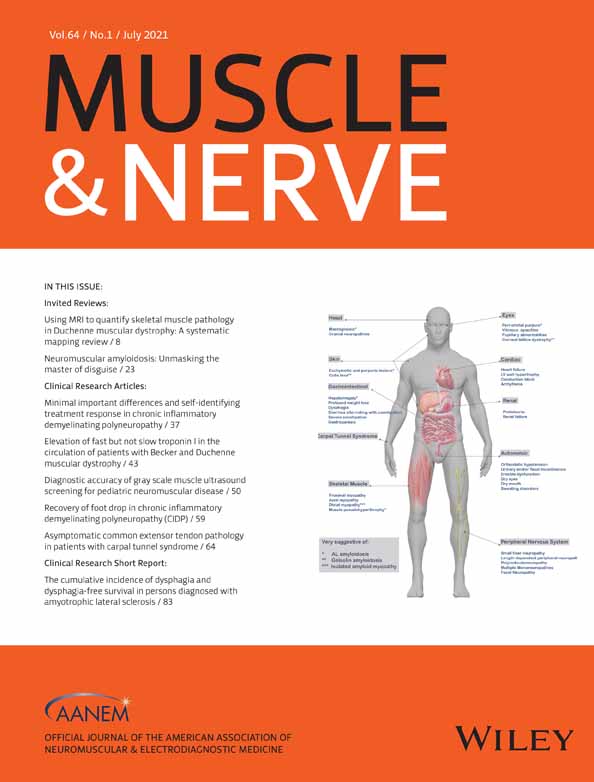TS-HDS and FGFR3 antibodies in small fiber neuropathy and Dysautonomia
Funding information: Brigham and Women's Hospital
Abstract
Introduction
The specificity of trisulfated heparin disaccharide/fibroblast growth factor receptor 3 (TS-HDS/FGFR3) antibodies in the diagnosis of autoimmune small fiber neuropathy (SFN) is unclear.
Methods
This was a retrospective study of patients evaluated for SFN and dysautonomia in the Brigham and Women's Faulkner Hospital Autonomic Laboratory in 2019–2020. Associations were assessed between TS-HDS/FGFR3 antibodies and SFN markers, including epidermal nerve fiber density (ENFD), sweat gland nerve fiber density (SGNFD), and autonomic dysfunction assessed by Valsalva maneuver, deep breathing, sudomotor, and tilt testing.
Results
Of 322 patients; 28% had elevated anti-TS-HDS, 17% had elevated anti-FGFR3, 96% had autonomic dysfunction, 71% had abnormal ENFD, and 49% had abnormal SGNFD. TS-HDS/FGFR3 antibodies were present in patients with autonomic dysfunction irrespective of whether they had normal or abnormal skin biopsies unless ENFD/SGNFD were combined for anti-FGFR3 seropositivity.
Discussion
TS-HDS/FGFR3 antibodies are present in patients with evidence of autonomic dysfunction. Further studies are needed to document the clinical value of these antibodies in assessment of immune mediated dysautonomia.
CONFLICT OF INTEREST
Peter Novak has received support from the Memory advancement by intranasal insulin in Type 2 Diabetes -MemAID- study; Trial Registration NCT02415556; FDA IND 107690; NIH-NIDDK R01DK103902; served as advisor - independent Contractor for Dysimmune Diseases Foundation, received speaker's honoraria from KabaFusion and Lundbeck, is a member of the Scientific Advisory Board of Endonovo Therapeutics, and has received royalties from Oxford University Press. Jorge Trevino received funding from the Memory advancement by intranasal insulin in Type 2 Diabetes -MemAID- study; Trial Registration NCT02415556; FDA IND 107690; NIH-NIDDK R01DK103902.
Open Research
DATA AVAILABILITY STATEMENT
The data that support the findings of this study are available on request from the corresponding author. The data are not publicly available due to privacy or ethical restrictions.




